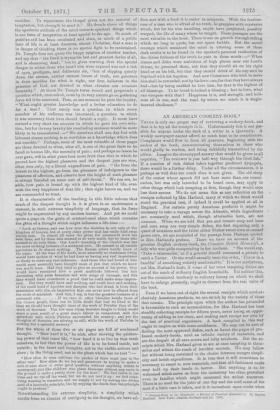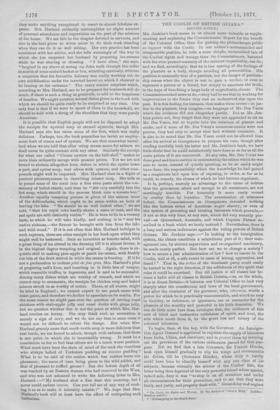AN AMERICAN COOKERY-BOOK.*
THERE is only one proper way of reviewing a cookery-book, and that is to try all the receipts in it. Unfortunately this is not pos- sible for anyone under the rank of a writer in a Quarterly. A weekly newspaper cannot afford so much time to its contributors. Complaints would flow in from all quarters, beginning with the author of the book, communicating themselves to those who would gladly be readers, and being faithfully transmitted by the editor. Imagine the stereotyped answer that would be given to all inquiries, "The reviewer is just hall-way through the fried fish." If a number of rich dishes taken together produced dyspepsia, there would be a further delay. Under all the cireurnstauces, it is perhaps as well that too much time is not given. The old story of the orator whose speech did not bear more than one exami- nation, but was only intended to be heard once, may apply to other things which look tempting at first, though they would soon lose their savour. We do not mean this as any reflection on the receipts collected by Mrs. Harland, many of which we think would stand the practical test, if indeed it could be applied at all in England. For certain purely American products it might be necessary to take a voyage across the Atlantic, while ingredients are constantly used which, though attainable here, are not common. When we are told that pea and tomato soup and bean and cora soup are very simple dishes, the first requiring only a quart of tomatoes and the latter either Shaker sweet corn or canned green corn, we are reminded of the passage from Dickens quoted in Mrs. 1-larlaud's preface. There we have an account of the genuine English cookery-book, the Complete British Housewife, a lady who was quite exasperating in her coolness. " She would say, Take a salamander,' as if a general should command a private to catch a Tartar. Or she would casually issue the order, "Throw in a handful' of something entirely unattainable." It is our misfortune, not Mrs. Harland's fault, if some of her most tempting dishes are out of the reach of ordinary English households. Yet neither this, nor the occasional tendency to culinary heresy on which we shall have to enlarge presently, ought to detract from the real value of the book.
Even if we leave out of sight the several receipts which need ex- clusively American products, we are struck by the variety of those that remain. The principle upon which the author has proceeded is favourable to such an accumulation, for Mrs. Harland has been steadily collecting receipts for fifteen years, never losing an oppor- tunity of adding to her store, and making each receipt her own by the teat of practical experience. A book compiled in this way ought to inspire us with some confidence. We may not be sure of fiuding the most approved dishes, such as haunt the pages of pro- fessed cookery-books, need an infinite variety of materials, and are the despair of all save severe and lofty intellects. But the re- ceipts which Mrs. Harlaud gives us are at once tempting in them- selves and within the reach of humbler mortals. We may follow her without being restricted to the choice between meagre simpli- city and lavish expenditure. It is true that it will sometimes be necessary to resort to new materials, and that old-fashioned cooks may hold up their hands in horror. But anything is to be welcomed which saves us from the monotony too often prevalent oven in families which might command the widest resources. There is uo need for the joint of one day and the cold meat of the next if a little care is taken, uor is it incumbent upon cooks when * Common-Sense in the Honsehold: a Manual of Practical llous‘toAry. By Marion Harland. Now York: Charles Scribner and Co. 1871. they make anything exceptional to resort to almost fabulous ex- pense. Mrs. Harland evidently contemplates no slight amount of personal attendance and supervision on the part of the mistress of the house. We see this in the chapter devoted to servants, and also in the hint given to wives never to do their work standing when they can do it as well sitting. Her own practice has been consistent with her advice, and she tells amusingly of the way in which she has surprised her husband by preparing ice-creams while he was shaving or dressing. "I have often," she says, "laughed in my sleeve at seeing my John walk through the cellar in search of some mislaid basket or box, whistling carelessly, without a suspicion that his favourite delicacy was coolly working out its own solidification under the inverted barrel on which I chanced to be leaning at his entrance." The many similar surprises which, according to Mrs. Harland, are to be prepared for husbands will do much, if there is such a thing as gratitude, to add to the happiness of families. We might mention several dishes given in the book with which we should be quite ready to be surprised at any time. Our only fear is that if we were to speak of them in the household, we should be told with a shrug of the shoulders that they were purely American.
It is possible that English people will not be disposed to adopt the receipts for squirrel soup or stewed squirrels, though Mrs. Harland says she has eaten some of the first, which was really delicious. Perhaps, too, the book prescribes too lavish an employ- ment both of cream and of oysters. We are thus somewhat tantal- ized when we are told that after using cream sauce for salmon we shall never be quite content with any other. Similarly the receipt for what are called " Cream oysters on the half-shell " makes us more than ordinarily savage with present prices. Yet we are not bound to abstain altogether from dishes in which the oyster bears a part, and oyster soup, veal olives with oysters, and other com- pounds might well be imported. Mrs. Harland rises in a flight of poetical picturesqueness in describing lobster soup. She tells us to pound some of the coral into a fine even paste about the con- sistency of boiled starch, and then to "stir very carefully into the hot soup, which should in the process blush into a roseate hue." Another equally tempting picture is given of the salmon trout of the Adirondacks, which ought to be eaten within an hour of leaving the lake. " He should be so well looked after," we are told, " that his royal robe hardly shows a seam or rent, and the red spots are still distinctly visible." He is then to lie in a creamy bath, to which he will take kindly, and nothing is to " mar his native richness,—the flavour he brought with him from the lake and wild-wood." If it is not often that Mrs. Harland indulges in such raptures, there are other receipts in her book upon which they might well be bestowed. Such an invention as tomato salad, with a great lump of ice stirred in the dressing till it is almost frozen, is in the highest degree tempting and original. Again, there is ex- quisite skill in making pine-apple or peach ice-cream, with freshly cut bits of the fruit stirred in while the cream is freezing. If it be not a profanation to imitate pate de foie gran, Mrs. Harland's plan of preparing calf's liver, and inserting in it little bits of tongue, which resemble truffles, is ingenious, and is said to be successful. Among many dishes which are worthy of remark, and which we cannot stop to enumerate, the receipts for chicken soup and baked salmon struck us as worthy of notice. These, at all events, might be tried in England ; we cannot expect to see peach sauce with roast game, and therefore we decline to speculate on its merits. For the same reason we might pass over the question of serving roast chickens with crab-apple jelly and roast ducks with grape jelly, but we question whether this is not the point at which Mrs. Har- land touches on heresy. She may think such an accusation is merely a sign of envy, and we do not say that in some cases it would not be difficult to refute the charge. But when Mrs. Harland gravely avers that mock-turtle soup is more delicious than real turtle, we are forced to admit, though with sadness, that there is one point in which she is inexcusably wrong. It must be a consolation to her to feel that others are in a much worse position. What must have been the state of mind of the cook she mentions who always talked of Yorkshire pudding as auction pudding ? What is to be said of the nation which has neither hares nor pheasants ; the name of hare being given to the wild rabbit, and that of pheasant to ruffled grouse ? But the lowest depth of all was reached by an Eastern woman who had removed to the West, and who was not ashamed to write the following letter to Mrs. Harland :—" My husband shot a fine deer this morning, but I never could endure season. Can you tell me of any way of cook- ing it so as to make it tolerably eatable ?" We hope that Mrs. Harland's book will at least have the effect of extirpating such barbarism.



































 Previous page
Previous page